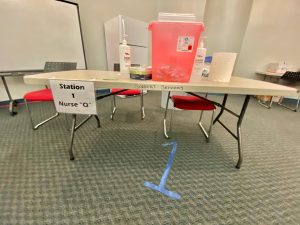OPINION | Tulane should mandate COVID-19 immunization
March 17, 2021

The never-ending tightening and loosening of restrictions among Tulane University’s campus and the city of New Orleans brightened the appeal of the COVID-19 vaccine. With each new development in immunizing another sector of the Tulane population, the community approaches normalcy. While students, faculty and staff finally managed to decrease positive COVID-19 cases to rates well under those of New Orleans, the fight for a return to normalcy rests on both the completion of a comprehensive vaccine rollout and the end of Tulanians’ contribution to the spread of the coronavirus.
Following Louisiana’s vaccine protocol, Tulane currently requires undergraduate students that live in the U.S. to be vaccinated for measles, mumps, rubella, tetanus, diphtheria, pertussis, meningitis and be screened for tuberculosis. Tulane also mandated a flu shot for all students beginning the spring 2021 semester. Failure to comply with the university’s vaccination guidelines result in an enrollment hold, but students can fill out a vaccine exemption form in which they can cite medical reasons, religious beliefs or personal beliefs waiving immunization requirements. Although Tulane can choose to approve a student’s request, the university is well within its legal right to exclude a student from attendance in the event of a vaccine-preventable disease outbreak.
Though there is currently no legal COVID-19 vaccine requirement for American universities, the American College Health Association strongly encourages college communities to vaccinate their members, citing the important role that colleges have in “encouraging high uptake of vaccines in the campus community.” The COVID-19 outbreak falls under the criteria of a vaccine-preventable outbreak and has the resources conducive to mass vaccination. As such, Tulane should require the COVID-19 vaccine for all students and be incredibly conservative in vetting immunization exemption requests.
The development and distribution of the COVID-19 vaccine faces skepticism — a survey of 1000 college students showed that 19% of college students do not support vaccine requirements and 10% are unsure. Despite this, the Tulane and New Orleans community must educate themselves through credible sources to realize the magnitude of the vaccine’s benefits compared to its drawbacks.
Tulane’s reputation as a party school and its setting in a city with a disproportionately vulnerable population demands that the university mandate the vaccine to all students prior to returning for the fall 2021 semester, prioritizing first and second-year students that live on campus and have a meal plan.
Tulane is the No. 2 party school in America, providing countless opportunities to participate in large gatherings. Events range from parties hosted by Greek organizations, one of the plethora of festivals that New Orleans offers annually, or the club and bar hotspots populated by Tulane students every weekend. Although Tulane handled testing and the spread of COVID-19 on campus with greater success compared to its party school counterparts, it is inevitable that the school’s party culture cannot merely evaporate, even in the face of a devastating pandemic. This is apparent in the numerous bars that Tulane students regularly attend being shut down since the semester commenced and the spikes in positivity rates occurring after holidays involving large social events, like Halloween. Due to the inevitable skirting of regulations by students looking to keep up their social life, a vaccine mandate would be imperative to keeping cases at a minimum next semester.
Tulane’s highly rated testing program and low positivity rates have aimed to ensure a minimized negative impact on the greater New Orleans community. Despite this, first- and second-year students that live and dine on campus come in contact with staff at a high rate. Tulane is the largest employer in New Orleans, a population that is predominantly Black and has a lower vaccination rate than other racial groups in the city. This highlights the added risk of not vaccinating students that live on campus and come into contact with staff members most frequently.
Tulane students are guests to New Orleans and call it their temporary home, and it would be selfish and ignorant to not realize the major ramifications of not administering the vaccine to those most likely to spread COVID-19 among local residents. In short, though the vaccine should be mandatory to all Tulane students, students that live on campus and have meal plans should be prioritized for inoculation due to the heightened risk they pose to the greater New Orleans community.
Although skepticism surrounding the vaccine may be voiced within the student population as the vaccine is made available to them, it would simply be thoughtless for students and irresponsible for the Tulane administration to not mandate the vaccine. To the same accord, Tulane should remain stringent with its vaccine exemption policies and attempt to mitigate disingenuous requests of those with invalid reasons to avoid inoculation.






















Leave a Comment